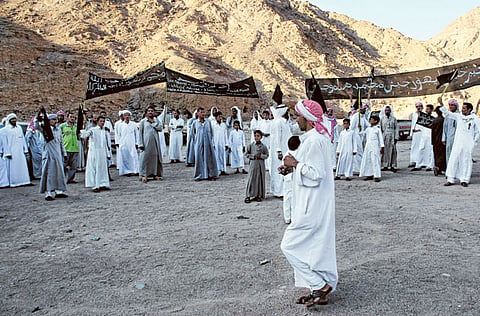Egypt ‘considering’ arming Sinai Bedouin
Move raises fears that the Bedouin could become a new militia

Cairo: In Egypt’s restive Sinai, Bedouin leaders are pushing to take matters into their own hands and urging the government to arm their tribesmen by creating a local security force in the peninsula, where the state is struggling to impose its authority and uproot Islamic militants who have attacked Egyptian troops and neighbouring Israel.
But the proposal, which the government says it is considering, raises fears that the Bedouin could become a new militia, only adding to the turmoil in the peninsula.
The idea highlights Cairo’s dilemma in Sinai. Bedouin who make up the bulk of the population in its northern deserts and southern mountainous areas deeply resent the central government, saying they have long suffered from discrimination and economic neglect at the hands of officials and brutal crackdowns by security officials, who in past years have detained thousands of Bedouin youth, torturing many. The resentment has pushed some young Bedouin to join violent Islamic extremist groups, and Bedouin are major players in cross-border smuggling of drugs and migrants, fuelling the lawlessness in the area.
As a result, security forces have had to work delicately in trying to end the threat from militant groups. The government of Islamist President Mohammad Mursi launched a major military operation, sending thousands of troops into the Sinai after militants killed 16 Egyptian soldiers in a brazen August 5 ambush near the Israel-Gaza borders. But the forces have refrained from aggressively attacking militants, wary of harming civilians and further angering the tribes of Sinai, which are already heavily armed.
Over the weekend, Mursi said in a speech in Cairo that security forces had identified some of those behind the ambush, which was part of an attempted attack into Israel. Troops had a chance to go after them, he said, but refrained because they were present at a gathering of several hundred civilians.
Leaders of main Bedouin tribes met with Interior Minister Ahmad Gamal Al Din, who is in charge of police, in late September and put forward the idea of the ministry taking on Bedouin to serve as a new security force, said Atiya Abu Qardud, a shaikh from the Al Ahiywat tribe in northern Sinai who participated in the meeting. Under the proposal, the tribes would put forward 1,000 people to be armed and trained by the Interior Ministry.
Security officials told The Associated Press that the government is still studying the idea. The officials wished to remain anonymous because they were not authorised to release the information.
“We have to work with the government,” Abu Qardud said. “Our goal is stop crime.”
He said that criminals and extremists would be hesitant to attack facilities or checkpoints manned by the Bedouin fighters because of the informal but strict tribal laws that prevail in the territory, including a tradition of tribal vengeance for killings. If a gunman from one tribe kills a Bedouin from another, he risks opening up a tribal war or revenge.
“My presence in my area makes it very difficult for anyone from inside or outside the tribe to approach me, even if I am holding a stick, because we deal with things through our tribal ways,” he said.
Others argue that this is precisely why a Bedouin force is potentially explosive, increasing tensions in a peninsula that is already awash in weapons.
“We refuse arming Sinai. We are not Yemen or Darfur,” said tribal elder Ebrahim Al Aryaf of the large Sawarka tribe of northern Sinai, who also attended the meeting. He said Bedouin already protect their own homes and areas.
Former Sinai lawmaker Abdullah Abu Jiahama warned that “people will kill each other if you arm them. This will widen the circle of security chaos and the problems between people.”
Abu Qardud argues that recruiting locals will help put an end to Islamic militant networks in northern Sinai and cross-border smuggling by offering local youth a chance to work with the government.
“We see this as a right of the people of the Sinai,” he said. “When a kid is out of school and can’t find work, he turns to crime to feed himself.”
In the late 1950s, then President Gamal Abdul Nasser created a Bedouin force in the Sinai known as the National Guard, which patrolled the land and Egypt’s borders with Israel, providing logistical support as well as guiding military convoys and units through the desert terrain. But successive Egyptian governments have eyed Bedouin with suspicion and questioned their allegiance to the state since Israel’s occupation of the territory in the 1967 war. Israel returned the peninsula as part of the 1979 peace deal between the two countries, fully withdrawing in 1982.
Ehab Yousuf, a former police officer who now does security consulting, including with the Interior Ministry, warns that creating a new force now could be a precedent for establishing local militias in other parts of Egypt.
“No one can be trusted to control security of just one area,” he said. “You are giving someone who already has guns more weaponry. I think it will be stupid of them if they do it.”
Sign up for the Daily Briefing
Get the latest news and updates straight to your inbox



